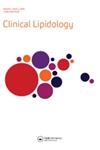吸烟/戒烟和代谢综合征
Q Medicine
引用次数: 24
摘要
代谢综合征(MetS)是一种常见的病前代谢血管危险因素/疾病(内脏肥胖、高血糖、血脂异常和高血压),与心血管(CV)发病率、脂肪肝和癌症风险增加相关。一些研究报告了吸烟者的met发病率更高。吸烟在许多慢性疾病如心血管疾病(CVD)、癌症、肺病等的发病机制中起着重要作用。然而,由于所谓的“吸烟悖论”的存在,这一危险因素对心血管疾病死亡率的影响仍不清楚。吸烟可能会增加MetS的风险或通过多种机制使其恶化。此外,戒烟的人往往会增加体重。体重增加的可能性会阻止吸烟者戒烟,并增加复发的风险,尤其是对女性而言。在此,我们回顾了吸烟状态(活跃/停止)与MetS的关系。本文章由计算机程序翻译,如有差异,请以英文原文为准。
Cigarette smoking/cessation and metabolic syndrome
Abstract The metabolic syndrome (MetS) is a common cluster of pre-morbid, modified metabolic–vascular risk factors/diseases (visceral obesity, hyperglycaemia, dyslipidaemia and hypertension) associated with increased cardiovascular (CV) morbidity, fatty liver and risk of cancer. Several studies reported a higher incidence of MetS in smokers. Cigarette smoking plays a substantial role in the pathogenesis of numerous chronic diseases such as CV disease (CVD), cancer, lung disease and others. However, due to the existence of the so-called “smoking paradox”, the impact of this risk factor on CVD mortality is still not clear. Smoking cigarettes may increase risk of MetS or worsen it by numerous mechanisms. Furthermore, individuals who quit smoking tend to increase their body weight. The possibility of gaining weight can stop smokers from quitting and increases the risk of relapse, particularly in women. Herein, we review the cigarette smoking status (active/cessation) in relation to the MetS.
求助全文
通过发布文献求助,成功后即可免费获取论文全文。
去求助
来源期刊

Clinical Lipidology
生物-生化与分子生物学
CiteScore
0.44
自引率
0.00%
发文量
0
审稿时长
6-12 weeks
期刊介绍:
The Journal of Clinical Lipidology is published to support the diverse array of medical professionals who work to reduce the incidence of morbidity and mortality from dyslipidemia and associated disorders of lipid metabolism. The Journal''s readership encompasses a broad cross-section of the medical community, including cardiologists, endocrinologists, and primary care physicians, as well as those involved in the treatment of such disorders as diabetes, hypertension, and obesity. The Journal also addresses allied health professionals who treat the patient base described above, such as pharmacists, nurse practitioners and dietitians. Because the scope of clinical lipidology is broad, the topics addressed by the Journal are equally diverse. Typical articles explore lipidology as it is practiced in the treatment setting, recent developments in pharmacological research, reports of treatment and trials, case studies, the impact of lifestyle modification, and similar academic material of interest to the practitioner. While preference is given to material of immediate practical concern, the science that underpins lipidology is forwarded by expert contributors so that evidence-based approaches to reducing cardiovascular and coronary heart disease can be made immediately available to our readers. Sections of the Journal will address pioneering studies and the clinicians who conduct them, case studies, ethical standards and conduct, professional guidance such as ATP and NCEP, editorial commentary, letters from readers, National Lipid Association (NLA) news and upcoming event information, as well as abstracts from the NLA annual scientific sessions and the scientific forums held by its chapters, when appropriate.
 求助内容:
求助内容: 应助结果提醒方式:
应助结果提醒方式:


